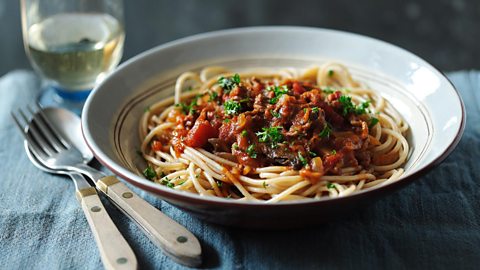Is eating quickly bad for your health?
Do you find yourself wolfing down your meals in a hurry? You might want to slow down. Here’s why…

When we’re in a rush, distracted by the TV or are thinking about our long to-do lists, most of us will, from time-to-time eat our meals faster than we’d like to.
But could eating more quickly be bad for your health? Here’s what the experts say…
How do you know if you’re a fast eater?
Dr. Sai Krishna Gudi, from the University of Manitoba, Canada has carried out research into the health impacts of fast eating and explains “there’s an apparent lack of evidence suggesting the ideal or optimum amount of time to spend eating, mainly it depends on the type of meal.
‚ÄúHowever, somewhere between 10 and 20 minutes is usually considered the ideal time to be spent while eating. Generally, less than or equal to 10 minutes is considered fast eating and more than or equal to 20 minutes is considered slow eating.‚ÄĚ
Even if you’re not timing your meals, it’s likely you’ll know if you’re a fast eater, says dietitian .
‚ÄúAsk yourself if you recognise any of these signs: Finishing your meals quicker than others eating with you, bloating after eating, feeling overly full after finishing, feeling like you want to snack more,‚ÄĚ these could all be signs that you‚Äôre a fast eater.
What are the possible health impacts?
Indigestion
This is the one we hear about the most, but it’s hotly debated. found that the eating speed didn’t impact symptoms in people with GERD (long-term acid reflux). However, eating too fast is reported to be a cause for .
Pillai explains we‚Äôre more likely to swallow air when eating fast and ‚Äúthis can lead to symptoms of indigestion‚Ķ Although eating fast is a contributor to indigestion, other factors such as stress and food choices, as well as existing digestive issues have a role.‚ÄĚ
Healthy spaghetti bolognese
Conversely, wholegrain ingredients ‚Äď like this spaghetti are reported to aid digestion

Type-2 diabetes
This is something Gudi, on. He examined real-world data from around the world (up until 2020) only focussing on ‚Äúhigh-quality studies‚ÄĚ and the result, ‚ÄúA possible relationship between eating fast and the risk of developing type 2 diabetes was noted.‚ÄĚ
So why could eating fast regularly put you more at risk? Gudi found several reasons. Firstly, if you eat fast, you’re , that’s because it takes around 20 minutes for our brains to receive a signal telling us we’re full, so if you eat quickly you could end up eating more before you know you’re full. This overeating could then increase your glucose levels.
Gudi also that shows that if you eat fast, you‚Äôre more likely to ‚Äėtrigger specific cytokines‚Ķ which eventually increases insulin resistance.‚Äô
Slow cooker vegetable soup
Take your time with a bowl of this nourishing soup and you’ll really appreciate it

However, says Gudi, there‚Äôs still lots learn on the subject ‚Äď especially when you consider that many of the studies that have examined this so far have relied on self-reported responses from study participants.
“Research should focus on developing a standard speed measurement scale or a smartphone application, which could further address this issue.
‚ÄúRandomised controlled trials and long-term interventional studies are needed to evaluate the causal relationship and whether eating slowly could actually prevent type 2 diabetes,‚ÄĚ he adds.
Weight gain
This is something Dr Toshiaki Ohkuma, Kyushu University, Fukuoka, Japan, .
“Our systematic review and meta-analysis, which included data from 23 studies, found a clear association between eating quickly and increased body weight, including obesity.
“People who ate quickly had a higher body mass index (BMI) by an average of 1.78 kg/m² compared to those who ate slowly. Additionally, fast eaters were more than twice as likely to be obese, with an odds ratio of 2.15.
“This relationship remained unchanged after adjustment for total energy intake. This highlights the importance of not just what and how much we eat, but also how quickly we eat.
‚ÄúEncouraging slower eating habits could be a practical strategy for preventing obesity,‚ÄĚ explains Ohkuma.
Pearl barley risotto with butternut squash, basil and ricotta
If you take your time with a dish like this ‚Äď which comes with lots of nutrients you‚Äôll likely feel full after 20 minutes

The reasons behind the increase in weight gain are similar to the potential increase in type-2 diabetes.“When eating quickly, individuals consume more calories before the brain receives signals of fullness, which are triggered by nutrient intake, stomach distension and the release of gut hormones. This delay in recognizing fullness leads to overeating, resulting in excessive calorie intake and weight gain.
‚ÄúAdditionally, fast eaters may chew less, reducing the activation of satiety-related pathways, further contributing to obesity.‚ÄĚ
Ohkuma warns: ‚ÄúEating fast can lead to other negative health outcomes besides obesity, as obesity is a major risk factor for various chronic conditions, including type 2 diabetes, hypertension, metabolic syndrome and cardiovascular diseases.‚ÄĚ
How to slow your eating down
A technique that can help people is mindful eating. ‚ÄúThis is about truly experiencing your food, tuning into the taste, texture, smell and every sensation that comes with eating,‚ÄĚ explains Dr. Michael Mantzios, professor of applied and experimental psychology at Birmingham City University, who has conducted research into .
‚ÄúPicture this. You're enjoying a meal, paying attention to taste, texture and/or smell and suddenly your mind wanders off to a to-do list, a work problem, or a recent conversation. Mindful eating is the practice of noticing when your mind drifts and gently bringing your focus back to the food in front of you. It's a cycle‚ÄĒattention, distraction and then a return to the moment.
‚ÄúWhether it's a sound that pulls you away or a thought that takes you elsewhere, mindful eating is about constantly bringing yourself back to the here and now, savouring each bite as it happens.‚ÄĚ
While the primary focus of mindful eating isn’t to slowdown when you’re eating, it’s a consequence.
‚ÄúMindful eating often leads to eating more slowly‚Ķ you naturally slow down, you pause to appreciate what you're eating and as a result, you take your time. So, while slower eating happens with mindfulness and mindful eating, it's not something you have to force; it just comes naturally as you focus more on the sensory experience.‚ÄĚ
Vegetable lasagne
With a dish like this lasagne, focus on the sensations you experience when eating it, you’ll then naturally slow your eating speed down

So how do you do it? ‚ÄúTry simple reflective practices‚ÄĒkeep a piece of paper next to your plate and write down a reminder of what you need to notice: the taste, smell, or texture of your food. It can be as simple as: What is the taste? What is the smell? What is the texture?
“You don’t need to write anything while you are eating, simply have it there as a reminder of what you are focusing on during the meal.
‚ÄúIf your mind wanders, that‚Äôs okay‚ÄĒjust remind yourself to refocus on the sensory experience and regardless of how many times it happens, repeating this cycle will make you a more mindful eater.‚ÄĚ
Originally published October 2024
Disclaimer: Please note, this article is focused on people who may eat faster than they wish due to distractions at mealtimes. Likewise, advice on how to slow down your eating speed is for people who are experiencing this problem. If you are concerned that your eating speed (or that of a loved one) is related to disordered eating, help and advice is available.
Beat's Head of Safeguarding, Kerri Fleming explains: “Whilst eating at a particular speed isn't a reliable way to tell if you have an eating disorder, it can sometimes be a warning sign in conjunction with other symptoms. People with binge eating disorder may eat large quantities of food, often quickly, whilst feeling out of control of their actions. Conversely, people with restrictive eating disorders such as anorexia may eat very slowly.
‚ÄúWe would urge anyone concerned about their health to visit their GP at the very earliest opportunity.‚ÄĚ